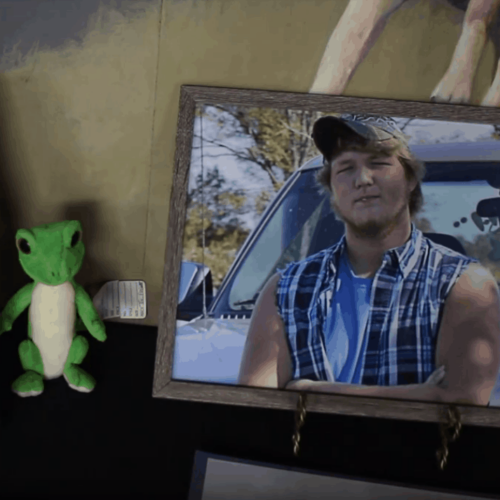This story was published in partnership with the Kentucky Center for Investigative Reporting.
Introduction
Mike and Pam Oakley have been telling this story for years: how their 17-year-old son died on his second day of work, and how the state worker safety agency failed to hold his employer accountable.
They’ve told their story to anyone who would listen. The state never did.
But now, after the state worker safety agency’s failings have been exposed by the federal government and an investigation by the Kentucky Center for Investigative Reporting, the Center for Public Integrity and Ohio Valley ReSource, state officials are finally paying attention to people like the Oakleys.
In recent weeks, the Labor Cabinet has announced major reforms for the agency, specifically around how it investigates fatalities.
And now, three top cabinet officials have driven to this small town, an hour south of Frankfort, on a Sunday, to share those plans with the Oakleys directly.
They’ve arrived as the Oakleys are setting up for their annual Workers Memorial Day event in Garrard County, laying out photos of their son, Grant, around the lobby of the Grand Theater.
Dwayne Depp, commissioner for Kentucky’s Department of Workplace Standards, shook Mike and Pam’s hands, and offered his sympathies. He asked what he could do to help.
“Y’all have no idea what this means to see you three standing here,” said Mike, choking back tears. “You have no idea.”
In Wake Of Loss, Family Pushes For Change
While Mike was eager to pin down some promises from the officials, Pam just wanted to tell them about the real person behind the mishandled fatality investigation. She wore a black t-shirt that read “Honoring GTO,” for Grant Thomas Oakley, her only child.
She pointed to a photo of Grant, an apple-cheeked 17-year-old, his arms crossed in a blue plaid shirt with the sleeves cut off. A ruffle of blonde hair sticks out from his camo baseball cap.
“He played the tuba in the band,” she told Depp, pointing out his marching band state championship medals. “He got first place in his junior year.”
She talked about how he was young, but he wanted to work.
“That’s just who he was,” she told Depp in a near whisper, her voice cracking. “That’s just who he was.”
Grant got his first part-time job at Bluegrass Agricultural Distributors, right across the street from his house. His second day of work happened to be Election Day, 2015, and he agreed to cover a shift so other employees could go to the polls. Grant wasn’t yet old enough to vote.
At work that day, he was riding on the side of a forklift. When he hopped off, his pants or shoes got caught and he ended up under the machine. He died at the hospital.
The Oakleys had a lot of questions. But when they got a copy of the state’s investigation, they found that investigators interviewed few of the eyewitnesses. The handwritten notes were illegible and disjointed.
Kentucky’s Occupational Safety and Health agency fined Bluegrass Agricultural Distributors $3,500 for not having a forklift training program. For the company, and the state, the case was closed.
For the loved ones Grant left behind, though, it was just the beginning. At Grant’s school, all the students honored him by dressing in flannel and camouflage. Mike started teaching OSHA safety classes. And he and Pam began pushing for more answers.
They asked federal OSHA to review the state’s handling of Grant’s death. The feds agreed that the investigation was so insufficient that they couldn’t even determine whether the violation the state issued was, in fact, correct. Federal OSHA proposed no consequences.
The Oakleys’ complaint to federal OSHA was one of several that prompted a special investigation into Kentucky’s worker safety program. A federal audit, released last summer, found that the state failed to properly investigate nearly every workplace fatality during fiscal years 2016 and 2017, including Grant’s.
That audit was first publicized as part of “Fatal Flaws,” an investigation by KyCIR, the Ohio Valley ReSource and the Center for Public Integrity. In that investigation, the Oakleys shared the story of Grant’s life, and his death, and how they’ve found themselves fighting for answers for all of Kentucky’s workers.
The Oakleys are relieved that changes are finally, slowly, beginning to emerge. They’re eager to be part of the reforms. But they’ve also learned to be suspicious of government promises.
“We’ve heard a lot of talk,” said Pam, trailing off.
Mike finished her thought.
“We’re going to be waiting to see what’s actually done.”
At Memorial Event, Signs Of Change

The Oakleys’ annual event is one of many Workers Memorial Day events held around the country on April 28th, the day the Occupational Safety and Health Act went into effect in 1971. But this event is no celebration of OSHA.
As the Oakleys have dedicated their lives to getting better treatment for victims of workplace accidents, they’ve connected with numerous other grieving families along the way.
Many of these families gather at the Oakleys’ annual Workers Memorial Day events, some driving hours across the state to Garrard County. It has become, over the past few years, a rallying point in the fight for acknowledgement from Kentucky’s state-run OSHA agency.
Last year, Ervin Dimeny, then the commissioner for the Department of Workplace Standards, arrived late and sat in the back as speaker after speaker eviscerated his agency.
After the event, Dimeny spoke to a reporter. All fatalities are tragic, he said, but there was nothing his agency could do to bring people back. He defended the worker safety agency, saying there are “states that are doing better and states that are doing worse” than Kentucky.
But Kentucky’s most recent federal audit, which covered Dimeny’s tenure, had more failings than any of the other 27 states that operate their own worker safety agencies.
According to the audit, state investigators routinely failed to interview eyewitnesses, identify the cause of incidents or flag all possible safety violations. In some cases, the state improperly blamed the employee for his or her own death.
These shoddy investigations, the federal audit concluded, left workers “continuously exposed to serious hazards that remain unabated.” And they left families more confused in the wake of a workplace tragedy.
Former Labor Secretary Derrick Ramsey moved to the Education and Workforce Development Cabinet last summer. He took Dimeny and much of the cabinet’s senior leadership with him.
That’s when Depp was brought in. He said he was hired specifically to reform the agency in the wake of the audit.
Since KyCIR’s investigation was released in November, the Labor Cabinet has announced an internal review of the state’s worker safety program. Labor officials have increased salaries in an effort to retain inspectors, and issued press releases about the required trainings their employees are now attending.
While Dimeny downplayed problems, Depp admitted in a recent interview that the state had, at times, failed to properly investigate fatalities and said he was trying to build a “culture of accountability” that had not always existed at the agency.
“I don’t want another family to experience some of the things that some of those families … have experienced when all they want is answers,” Depp said. “I feel like our job is to be able to give them those answers.”

In that interview, he said he had not met with any of the families who had their cases mishandled. A few weeks later, he showed up at the Workers Memorial Day in Garrard County.
Depp came with David Dickerson, the top official at the Labor Cabinet appointed by Gov. Matt Bevin, and Chuck Stribling, the state employee responsible for making sure Kentucky’s worker safety agency is meeting federal standards.
Only Stribling was with the agency when Oakley died, or during the time period covered by federal OSHA’s scathing assessment.
But, now, after years of closed doors and evasive non-answers from state officials, the Oakleys were finally hearing directly from three top Labor Cabinet officials.
“We are a work in progress,” Depp said. “We’re changing a lot of things that we’ve been doing, really focusing on making sure that when we get done, we’ll be able to answer all the questions that the family has at the end of our investigation.”
In the long run, the Oakleys want more than just a drop-by visit. Even if they can’t get Grant’s case reopened — the company he worked for has since closed, and the eyewitnesses are long gone — they want a guarantee that this will never happen to another family. They want to be part of the change the agency is promising, starting by meeting with the inspectors to educate them on how to deal with grieving families.

Depp offered to come back, with Dickerson, for a follow-up meeting. He gave Mike Oakley his card with his personal cell phone number, and told him to call anytime.
“We’re happy to have your input,” Dickerson said. “Please don’t be bashful.”
Mike Oakley, towering over the state officials in head-to-toe denim with his big, gray beard, burst into laughter. Pam joined in.
Some of Mike’s students were there too. After Grant’s death, Mike got certified to teach OSHA safety courses.
This year, Mike’s speech was brief and conciliatory. It was almost hopeful.
“We are here to honor those workers that didn’t make it home,” he said. “We’re not here for us. We’re here for them. Because I, personally, refuse to let these people lay dormant in a file somewhere as a number.”

He looked directly at the three state officials sitting in the audience, hoping they were finally hearing all the grief and frustration and pain these families have suffered.
“They are so much more, and they deserve so much more.”
As Mike stepped down from the stage, Andy Sims took his place. The Oakleys brought Sims, the Commonwealth’s Attorney for Jessamine and Garrard County, into their fight as well. Sims wanted to bring criminal charges related to Grant’s death, but he said he was hampered by the state’s poor OSHA investigation.
Sims began slowly reading the names of every worker who died in Kentucky over the last year. Grant’s friends and some of Mike’s students walked on stage, one by one, wearing name tags to represent each of the fallen.
“You get to know me, you’ll see that I’m not,” Mike responded. “I wasn’t given that gift.”
Later, Dickerson told KyCIR that Depp’s reforms have his full support, as well as the governor’s.
“I will tell you today, this iteration of the Labor Cabinet cares about doing thorough, competent, complete investigations to give families some sense of closure in the event of an unfortunate occurrence,” Dickerson said.
‘They deserve so much more’
The state officials took their seats in the Grand Theater, the only suits in a crowd of work shirts and motorcycle vests.
All around them were the friends and families — the living victims — of those who died on the job, only to have the state fall short in investigating the circumstances.
After the speeches, they wrote the names of the people they were representing on balloons. The crowd moved outside and reassembled in a circle around a small obelisk in the dusty parking lot. They released the balloons, and everyone watched them float away until they disappeared.

Since Nov. 3rd, 2015, the Oakleys have been fighting in memory of Grant. But over the years, it’s become just as much about these people, and the loved ones they leave behind. The Oakleys have been fighting so no one else will have to.
And they have no plans to stop. But for the first time in years, they may be fighting alongside the state, rather than against it.


Join the conversation
Show Comments